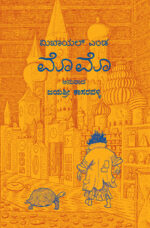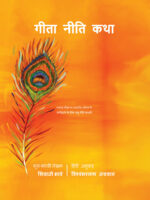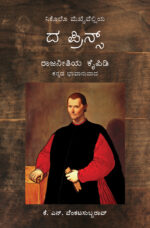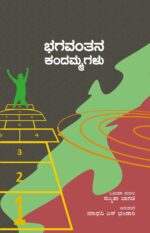Phedra
₹180.00
Translator: Madhava Chippalli
ರಾಸೀನ್ನ ಫೀದ್ರಾ ನಾಟಕವು ಪಾಶ್ಚಿಮಾತ್ಯ ನಾಟಕ ಸಾಹಿತ್ಯದಲ್ಲೇ ಒಂದು ಆಯಕಟ್ಟಿನ ಕೃತಿ. ಗ್ರೀಕ್ ಮತ್ತು ಎಲಿಜಬೆಥನ್ ನಾಟಕಗಳಲ್ಲಿ ಕಾಣಸಿಗದ ಹೊಸ ಬಗೆಯ ಮನೋಲೋಕವೊಂದನ್ನು ತನ್ನ ಪಾತ್ರಗಳಿಗೆ ಧಾರಣೆ ಮಾಡಿಸಿದ ಈ ನಾಟಕವು ಆ ಮೂಲಕವೇ ಈ ಪರಂಪರೆಯಲ್ಲಿ ಮನೋವಿಜ್ಞಾನಕ್ಕೆ ಒಂದು ಖಾಯಂ ಸ್ಥಾನವನ್ನು ಒದಗಿಸಿಕೊಟ್ಟಿತು. ಮುಂದೆ ಬಹುತೇಕ ಪಾಶ್ಚಿಮಾತ್ಯ ನಾಟಕಗಳು ಈ ಪರಂಪರೆಯನ್ನು ಮುಂದುವರಿಸಿದವು; ರಂಗಭೂಮಿಯಲ್ಲೂ ಮನೋಲೋಕವನ್ನು ಮುಂದಕ್ಕೆ ತರುವ ವಿಭಿನ್ನ ಪ್ರಯೋಗಗಳಿಗೆ ಈ ಪರಂಪರೆಯು ಚಾಲ್ತಿ ನೀಡಿತು. ಈ ಸಂಪ್ರದಾಯಕ್ಕೆ ವಿರೋಧಿಯಾದ ಫ್ರಾನ್ಸಿನ ಪ್ರಸಿದ್ಧ ರಂಗಕರ್ಮಿ ಆಂತೋನಿನ್ ಆರ್ತೋನ ಮಾತುಗಳನ್ನು ಕೇಳುವುದಾದರೆ, ಪಾಶ್ಚಿಮಾತ್ಯ ರಂಗಭೂಮಿಯಲ್ಲಿ ‘ಸೈಕಾಲಜಿಯ ದುರ್ಬೀಜ’ ಬಿತ್ತಿದ ಕೃತಿ ಇದು! ಹಾಗಿರುವುದರಿಂದ, ನಾವು ಈ ನಾಟಕವನ್ನು ಹೇಗೇ ಓದಲಿ, ಓದದೆ ಇದ್ದರೆ ಅಷ್ಟರ ಮಟ್ಟಿಗೆ ಪಾಶ್ಚಾತ್ಯ ನಾಟಕ ಸಂಪ್ರದಾಯದ ಅರಿವು ಅಪೂರ್ಣ. ಅಂಥ ಪ್ರಮುಖ ನಾಟಕವೊಂದು ಇನ್ನೂ ಕನ್ನಡಕ್ಕೆ ಬಾರದೆ ಉಳಿದಿತ್ತು; ಆ ಲೋಪವನ್ನು ಈ ಅನುವಾದವು ಸಮರ್ಥವಾಗಿಯೇ ತುಂಬಿಸಿದೆ. ಮೂಲದ ನಿಷ್ಠೆಯೊಂದಿಗೆ ಭಾಷಾಗಾಂಭೀರ್ಯ ಮತ್ತು ಮಾತಿನ ಸುಭಗತೆ ಎರಡನ್ನೂ ಒಟ್ಟಿಗೇ ಹಿಡಿಯಲು ಯತ್ನಿಸಿರುವ ಈ ಅನುವಾದವನ್ನು ನಾನು ತುಂಬು ಮನಸ್ಸಿನಿಂದ ಸ್ವಾಗತಿಸುತ್ತೇನೆ.
Interested readers may write to us at mup@manipal.edu about purchasing the book.
| Categories: | Kannada, Plays and Theatre, Texts in Translation |
|---|
| Format | |
|---|---|
| Author |
Related products
-
Two Plays – The Sahyadri Saga and The World of Swayamvara
₹199.00Author: Akshara K V Translator: Jayanth Kodkani
These two plays negotiate with the real problems of contemporary India. If Sahyadri Kanda is about the ripples caused in the life of the people in a village on the Western Coast which will soon have a nuclear plant, Swayamvaraloka, is an allegorical narrative set in a small village that extends to include the larger contemporary world. Both the plays dwell on the seeming binaries of village-city, success-failure, modern-traditional while examining the nature of human relationships in the changing world. These plays also reflect an ambition to elevate the real experience to a mythical level. While most playwrights attempt to echo contemporary concerns by reinterpreting history and mythology, for these plays, the epics, their grandeur, the struggle, the wars are not episodes that happen in kingdoms and palaces and battlefields, they are also that which takes place in the microworld of one’s consciousness. Each character in these plays find their own dharma, yet it offers no model for the reader, and remains only a pointer to the complex process of finding it.
Interested readers may write to us at mup@manipal.edu about purchasing the book.
Also available on

eBook available on

-
MOMO
₹450.00Author: Michael Ende ,Translator: Jayashree Kasaravalli
The fantasy novel originally written in German and translated into English, has been enjoyed by millions of readers worldwide. It has now been translated into Kannada as well. The novel has a very unusual story about time. The story describes how people in the modern era use the time, and a girl named MOMO teaches how it should be used. Humans have stolen time from modern societies, and a little girl of mysterious origin brings it back. In today’s society, the story has timeless relevance.
ನಗರದ ಅಂಚಿನಲ್ಲಿ ಹಾಳುಬಿದ್ದಿದೆ ಒಂದು ಆಂಪಿ ಥೀಯೇಟರ್. ಅಲ್ಲಿರುವ ದಿಕ್ಕಿಲ್ಲದ ಪುಟ್ಟ ಹುಡುಗಿ ಮೊಮೊ. ಒಂದು ದಿನ ಬೂದು ಬಣ್ಣದ ಬಟ್ಟೆ ತೊಟ್ಟು ದುಷ್ಟರು ಸದ್ದಿಲ್ಲದೇ ಬಂದು ನಗರವನ್ನು ಆಕ್ರಮಿಸಿಕೊಳ್ಳುತ್ತಾರೆ. ಅವರನ್ನು ಹಿಮ್ಮೆಟ್ಟಿಸುವ ಶಕ್ತಿಯಿರುವುದು ಮೊಮೊಗೆ ಮಾತ್ರ. ಅವಳು ಪ್ರೊಫೆಸರ್ ಹೋರಾ ಮತ್ತು ಅವರಲ್ಲಿರುವ ವಿಚಿತ್ರ ಆಮೆಯ ನೆರವಿನಿಂದ ಕಾಲದ ಸರಹದ್ದುಗಳನ್ನು ದಾಟಿ ಆ ದುಷ್ಟರ ಒಳಸಂಚುಗಳನ್ನು ಬಯಲುಮಾಡುತ್ತಿದ್ದಾಳೆ. ‘ಮೊಮೊ’ ಕಾಲವನ್ನು ಕದಿಯುವವರ ಕಥೆಯಾಗಿರುವ ಜೊತೆಗೇ ಕದ್ದ ಕಾಲವನ್ನು ಮತ್ತೆ ಜನರಿಗೆ ತಂದುಕೊಡುವ ಒಂದು ಮಗುವಿನ ಸಾಹಸಮಯ ಕಥೆಯು ಆಗಿದೆ.
Interested customers may write to us at mup@manipal.edu about purchasing the book.
-
Geeta Niti Katha
₹850.00Author: Shivaji Bhave, Translator: Vishambharnath Agarwal
यह पुस्तक भगवद् गीता के प्रत्येक श्लोक पर आधारित लघुकथाओं का संकलन है। ये कथाएँ श्री शिवाजी भावे (आचार्य विनोबा भावे के छोटे भाई) ने 1950 के दशक में मराठी में लिखी। इन कथाओं की परम्परा पंचतंत्र और Aesop’s Fables से शुरू होती है।
कथाएँ बहुत ही रोचक और सरल हैं एवं गीता के गहन विषय को सुगमता से समझने में सहायक भी। जीवन के मूल्यों को बहुत ही सरल भाषा में समझाती है जिससे बच्चे बूढ़े और युवा सभी कुछ न कुछ ग्रहण कर सकते हैं।
Interested customers may write to us at mup@manipal.edu about purchasing the book.
-
The Prince
₹199.00Author: K N Venkatasubba Rao
ಮೆಖೈವಲ್ಲಿ ನವೋದಯ ರಾಜತಾಂತ್ರಿಕ, ತತ್ವಜ್ಞಾನಿ, ಬರಹಗಾರ. ಇಟಲಿಯ ಫ್ಲಾರೆನ್ಸ್ ನಗರದ ಬಡಕುಟುಂಬದಲ್ಲಿ 1469ರಲ್ಲಿ ಜನಿಸಿದ ಮೆಖೈವಲ್ಲಿ ತನ್ನ 21ನೆಯ ವಯಸ್ಸಿನಲ್ಲಿ ಫ್ಲಾರೆಂಟೈನ್ ಪ್ರಾಂತ್ಯದ ರಾಜಕೀಯ ರಂಗ ಪ್ರವೇಶಿಸಿದ. ಫ್ಲಾರೆನ್ಸಿನ ಆಡಳಿತಕ್ಕೆ ಅಗತ್ಯ ಬೇಹುಗಾರಿಕೆ ಮಾಹಿತಿ ಒದಗಿಸುವುದು ಮೆಖೈವಲ್ಲಿಯ ಹೊಣೆಯಾಗಿತ್ತು. ಅಧಿಕಾರದ ಗಳಿಕೆ, ಬಳಕೆ ಮತ್ತು ರಕ್ಷಣೆಯ ನಿಟ್ಟಿನಲ್ಲಿ ಮನುಷ್ಯ ಪ್ರಪಂಚಕ್ಕೇ ಅನ್ವಯವಾಗಬಲ್ಲಂತಹ ಮಾರ್ಮಿಕವಾದ ಬೃಹತ್ ವಿನ್ಯಾಸ ಅವನೊಳಗೆ ರೂಪುಗೊಳ್ಳುತ್ತಿತ್ತು. ಈ ಸಂದರ್ಭದಲ್ಲೇ ಫ್ಲಾರೆನ್ಸ್ ಗಣರಾಜ್ಯ ಪತನಗೊಂಡಿತು. ರಾಜಕುಟುಂಬದ ವಿರುದ್ಧ ಪಿತೂರಿಯ ಆರೋಪಕ್ಕೆ ಗುರಿಯಾಗಿ ಮೆಖೈವಲ್ಲಿ ಅಧಿಕಾರಭ್ರಷ್ಟನಾಗಬೇಕಾಯಿತು. ತನ್ನ ಜೀವಿತದ ಮುಂದಿನ ದಿನಗಳನ್ನು ಬರವಣಿಗೆಗೆ ಮೀಸಲಿಟ್ಟಿದ್ದ ಮೆಖೈವಲ್ಲಿ ಐವತ್ತೆಂಟನೆಯ ವಯಸ್ಸಿನಲ್ಲಿ ಅಂದರೆ 1527ರಲ್ಲಿ ವಿಧಿವಶನಾದ. 1532ರಲ್ಲಿ ಅಚ್ಚು ಕಂಡ ಅವನ `ಪ್ರಿನ್ಸಿಪೆ’, ಇಂಗ್ಲಿಷಿನಲ್ಲಿ `ದ ಪ್ರಿನ್ಸ್ ‘ ಆಗಿ 1640ರಲ್ಲಿ ಅಧಿಕೃತವಾಗಿ ಪ್ರಕಟಗೊಂಡಿತ್ತು. ಯುರೋಪಿನ ವ್ಯಾಪ್ತಿಯೊಳಗೆಯೇ ಸಾಕಷ್ಟು ವದಂತಿಗಳಿಗೆ ಒಳಗಾಗಿದ್ದ `ಪ್ರಿನ್ಸಿಪೆ’, `ದ ಪ್ರಿನ್ಸ್ ‘ ಆಗಿ ಮೆಚ್ಚುಗೆ ಮತ್ತು ಟೀಕೆಗಳನ್ನು ಇಂದಿಗೂ ಎದುರಿಸುತ್ತಲೇ ಇದೆ. ಮೆಖೈವಲ್ಲಿ `ಆಧುನಿಕ ರಾಜತಂತ್ರದ ಜನಕ’ ಎಂಬ ಹೆಗ್ಗಳಿಕೆಗೆ ಪಾತ್ರನಾಗಿದ್ದಾನೆ. ಅವನನ್ನು ಅರ್ಥಶಾಸ್ತ್ರದ ಕರ್ತೃ ಕೌಟಿಲ್ಯನೊಡನೆ ಹೋಲಿಸುವ ವಾಡಿಕೆ ಇದೆ. ಇದು ಎಷ್ಟು ಸಮಂಜಸ ಎಂಬುದರ ಬಗ್ಗೆಯೂ ಪ್ರಾಜ್ಞರ ನಡುವೆ ಜಿಜ್ಞಾಸೆಯಿದೆ.
Interested customers may write to us at mup@manipal.edu about purchasing the book.
Also available on

-
Mahāmmāyi
₹195.00Author: Chandrasekhara Kambara, Translator: Kathyayini Kunjibettu
Mahāmmāyi is the story of the legend of Shatavithaayi – the Goddess of death, and her adopted son Sambhashiva. Out of affection for her son, Goddess Shatavithaayi blesses him with the “power of life”. The blessing was that death will evade the people who are treated by Sambashiva. But a certain condition set by Shatavithaayi forbade him from healing every ill man. The condition was that, if Shatavithaayi stood on the right side of the patient, Sambhashiva could treat that person and he would live; but, if she stood on the left side of the patient, he should not treat that person as his death was inevitable. Through a distinct method of story-telling, the story follows the life of Sambhashiva as he begins to question the ideas of fate and destiny. Thus, the conflict between fate and human efforts to change that fate is vividly described in this play. -
Nanna Parni Shaale
₹290.00Author: Thakur S Powdyel Translator: N T Bhat
ನನ್ನ ಪರ್ಣ ಶಾಲೆ ಠಾಕೂರ್ ಎಸ್ ಪಡೆಯಲು ಅವರು ಇಂಗ್ಲಿಷಿನಲ್ಲಿ ರಚಿಸಿದ ಪುಸ್ತಕದ ಕನ್ನಡ ಅನುವಾದ, ಭೂತಾನ್ ರಾಜ್ಯದಲ್ಲಿ ರಾಷ್ಟ್ರವ್ಯಾಪಿಯಾಗಿ ಅಳವಡಿಸಲಾದ ಶಿಕ್ಷಣ ಯೋಜನೆಯನ್ನು ಪೌಡಿಯಲ್ “ಮೈ ಗ್ರೀನ್ ಸ್ಕೂಲ್” ಎಂಬ ಹೆಸರಿನಲ್ಲಿ ವಿವರಿಸಿದ್ದಾರೆ. ಮೂಲದ ಇಂಗ್ಲಿಷ್ ಶೀರ್ಷಿಕೆ ಹೊಂದಿಕೊಳ್ಳುವಂತ ಈ ಅನುವಾದಕ್ಕೆ ಪರ್ಣ ಶಾಲೆ ಎಂಬ ಶೀರ್ಷಿಕೆಯನ್ನು ನೀಡಲಾಗಿದೆ. ವಿದ್ಯಾರ್ಥಿ ವ್ಯಕ್ತಿತ್ವ ವನ್ನು ಸರ್ವಾಂಗೀಣ ವಾಗಿ ರೂಪಿಸುವ ಉದಾತ್ತ ಧೈರ್ಯವನ್ನು ಶಿಕ್ಷಣವು ಹೊಂದಿರಬೇಕೆಂಬುದನ್ನು ಈ ಪುಸ್ತಕದಲ್ಲಿ ಗಂಭೀರವಾಗಿ ಪ್ರತಿ ಪಾದಿಸುತ್ತಾರೆ. ಮನುಷ್ಯನು ಪ್ರಕೃತಿಯೊಂದಿಗೆ ತಾದಾತ್ಮ್ಯ ಭಾವವನ್ನು ಹೊಂದಿಕೊಳ್ಳುವುದು ಸರ್ವಾಂಗೀಣ ವ್ಯಕ್ತಿತ್ವದಲ್ಲಿ ಆಂತರ್ಗತವಾಗಿದೆ. ಶಿಕ್ಷಣಕ್ಕೆ, ಶಿಕ್ಷಣ ಸಂಸ್ಥೆಗಳಿಗೆ ಈ ಲಕ್ಷ್ಯವೂ ಇರಬೇಕೆಂಬುದು ಸ್ವತಸ್ಸಿದ್ದ. ಈ ನಿಟ್ಟಿನಲ್ಲಿ ಉದಾತ್ತ ಶಿಕ್ಷಣ ನೀಡುವ ಶಾಲೆಯನ್ನು ಗ್ರೀನ್ ಸ್ಕೂಲ್ ಎಂದು ಕರೆಯುವುದು ಸರ್ವಥಾ ಸ ರಿ. ಅಂತೆಯೇ ಈ ಶಿಕ್ಷಣ ನೀತಿಯನ್ನು ಭಾರತದಲ್ಲೂ ವ್ಯಾಪಕವಾಗಿ ಅಳವಡಿಸುವುದು ಅಪೇಕ್ಷಣೀಯ.
Also available on

eBook available on

-
Bhagavantana Kandammagalu
₹190.00Author: Susmita Bagchi, Translator: Madhavi S Bhandary
ಅನುಪೂರ್ವಾ ಒಲ್ಲದ ಮನಸ್ಸಿನಿಂದ ಅನಿವಾರ್ಯವಾಗಿ ಅಮೇರಿಕಾ ಬಿಟ್ಟು ಭಾರತಕ್ಕೆ ಬರಬೇಕಾಯಿತು. ಕಲಾಶಿಕ್ಷಕಿಯಾಗಿ ಅಲ್ಲವಳ ಜೀವನ ಸುವ್ಯವಸ್ಥಿತವಾಗಿ ಸಾಗುತ್ತಿತ್ತು. ಭಾರತಕ್ಕೆ ಹಿಂದಿರುಗಿದ ನಂತರ ಅವಳ ಬದುಕು ಆಮೂಲಾಗ್ರವಾಗಿ ಬದಲಾಯಿಸಬಹುದೆಂದು ಅವಳು ಕನಸು-ಮನಸಲ್ಲೂ ಎಣಿಸಿರಲಿಲ್ಲ. ಒಮ್ಮೆ ಅವಳ ಕಾಲೇಜಿನ ಗೆಳತಿಯೊಬ್ಬಳು ಸೆರೆಬ್ರಲ್ ಪಾಲ್ಸಿ (ಮೆದುಳಿನ ಲಕ್ವ)ಯಿಂದ ಬಳಲುತ್ತಿರುವ ಮಕ್ಕಳ ಶಾಲೆ ‘ಆಶಾಜ್ಯೋತಿ’ಯ ಪರಿಚಯ ಮಾಡಿಸಿದಳು. ಅಲ್ಲಿಯೇ ಸ್ವಲ್ಪಕಾಲ ಆರ್ಟ್ ಟೀಚರ್ ರೂಪದಲ್ಲಿ ಸ್ವಯಂಸೇವಕಿಯಾಗಿ ಕೆಲಸ ಮಾಡುವ ಅವಕಾಶವೂ ದೊರೆಯಿತು. ಚಿತ್ರಗಳನ್ನು ಬಿಡಿಸುವುದು ಹೇಗೆ, ಅದಕ್ಕೆ ಹೇಗೆ ಬಣ್ಣ ತುಂಬಬೇಕು ಇತ್ಯಾದಿ ವಿಷಯಗಳನ್ನು ಅಲ್ಲಿಯ ಮಕ್ಕಳಿಗೆ ಹೇಳಿಕೊಡಲಾರಂಭಿಸಿದಳು. ಆದರೆ ಆ ಮಕ್ಕಳು ಅವಳಿಗರಿವಿಲ್ಲದಂತೆ ಗೆಳೆತನದ, ಪ್ರೇಮದ, ನಗುವಿನ, ಎಲ್ಲಕ್ಕಿಂತಲೂ ಮಿಗಿಲಾಗಿ ರೋಗದೊಂದಿಗೆ ಹೋರಾಡುವ ಪಾಠ ಅರ್ಥಾತ್ ಬದುಕಿನ ವಾಸ್ತವಿಕತೆಯ ಪಾಠ ಕಲಿಸಬಹುದೆಂದು ಅವಳಿಗೇನು ಗೊತ್ತಿತ್ತು! ಹೊರಜಗತ್ತು ಅವರನ್ನು ಶಾರೀರಿಕ ಅಥವಾ ಮಾನಸಿಕ ದೃಷ್ಟಿಯಿಂದ ದುರ್ಬಲರೆಂದು ತಿಳಿದುಕೊಳ್ಳಲಿ! ಆದರೆ ಅವರ ಅಂತರಂಗದಲ್ಲಿ ಏನನ್ನಾದರೂ ಸಾಧಿಸಬೇಕೆಂಬ ಅಪಾರ ಕ್ಷಮತೆ ಅಡಗಿದೆ ಎಂಬುದು ಅವಳ ಅರಿವಿನ ಕ್ಷಿತಿಜವನ್ನೇ ವಿಸ್ತರಿಸಿತು. ಅನುಪೂರ್ವಾ ಮತ್ತಾರೂ ಅಲ್ಲ, ಸ್ವಯಂ ಲೇಖಕಿಯೇ! ಈ ಮಕ್ಕಳ ಅಂತರಂಗದ ಪುಟಗಳನ್ನು ಅತ್ಯಂತ ಹತ್ತಿರದಿಂದ ನೋಡಿದ್ದಾರೆ; ತಿಳಿದಿದ್ದಾರೆ; ಮತ್ತದನ್ನು ಶಬ್ದಗಳ ಮೂಲಕ ಕಾದಂಬರಿಯ ರೂಪದಲ್ಲಿ ಜೋಡಿಸಿದ್ದಾರೆ. ಈ ಒಂದು ರೋಚಕವಾದ ಕಥೆ ಒಡಿಯಾದಲ್ಲಿ ‘ದೇಬಶಿಶು’ವಾಗಿದ್ದುದು, ಅಜಯ್ ಪಟ್ನಾಯಕ್ರು ಅದನ್ನು ‘ದೇವಶಿಶು’ ವಾಗಿ ಹಿಂದಿಗೆ ಅನುವಾದಿಸಿದರು. ಆ ಹಿಂದಿ ಅನುವಾದವು ಜ್ಞಾನಪೀಠ ಪ್ರಕಾಶನದಿಂದ ಪ್ರಕಟಗೊಂಡಿದೆ. ಈ ಕೃತಿಯು ಬಿಕ್ರಮ್ ಕೆ. ದಾಸ್ರಿಂದ ‘Children of Better God’ ಎಂಬ ಹೆಸರಿನಲ್ಲಿ ಆಂಗ್ಲ ಭಾಷೆಗೂ ಅನುವಾದಗೊಂಡಿದೆ. ಇದೀಗ ‘ಭಗವಂತನ ಕಂದಮ್ಮಗಳು’ ರೂಪದಲ್ಲಿ ಕನ್ನಡದ ಓದುಗರ ಮುಂದಿದೆ.
Interested customers may write to us at mup@manipal.edu about purchasing the book.
Also available on

-
Christa Shaka 1800 Ra Modalina Mysooru ithihaasa
₹295.00Author: D S Achuta Rao Translator: S Narendra Prasad
೧೮೦೦ ಕ್ರಿ. ಶ. ದ ಹಿಂದಿನ ಮೈಸೂರು ಇತಿಹಾಸವು ಪ್ರೊ. ಡಿ ಎಸ್ ಅಚ್ಯುತ ರಾವ್ ಅವರ ಜೀವನ ಮತ್ತು ಕೆಲಸದ ಬಗ್ಗೆ. ಮೈಸೂರು ಇತಿಹಾಸದ ಕುರಿತಾದ ಅವರ ಸಂಶೋಧನೆಯು 1940-65ರ ಅವಧಿಯಲ್ಲಿ ಅವರು ಪ್ರಕಟಿಸಿದ ಹತ್ತು ಸೂಚ್ಯಂಕ ಲೇಖನಗಳಿಂದ ಪ್ರತಿನಿಧಿಸುತ್ತದೆ. ಅವರು ಭಾರತದ ಇತಿಹಾಸ ಮತ್ತು ಅದರ ಅದ್ಭುತ ಭೂತಕಾಲವನ್ನು ಸಕ್ರಿಯವಾಗಿ ಜನಪ್ರಿಯಗೊಳಿಸಿದರು. ಮಹಾರಾಜಾಸ್ ಕಾಲೇಜ್ ಹಿಸ್ಟರಿ ಸೊಸೈಟಿ, ಭಾರತದ ವಸಾಹತು ಸಂಶೋಧಕರು ಮತ್ತು ಕನ್ನಡ ವಿಶ್ವಕೋಶದಲ್ಲಿ ಮೈಸೂರು ಸರ್ಕಾರದ ಉಪಕ್ರಮದಿಂದ ಭಾರತೀಯ ಇತಿಹಾಸದಲ್ಲಿ ಉಪಕ್ರಮಗಳನ್ನು ಪ್ರಸ್ತುತಪಡಿಸುವುದರಿಂದ ಅಂತಹ ಮೂರು ಲೇಖನಗಳನ್ನು ಸೇರಿಸಲಾಗಿದೆ. ಎರಡನೇ ಭಾಗದಲ್ಲಿ ಅವರ ಜೀವನಚರಿತ್ರೆಯಲ್ಲಿ, ಅವರ ವಿದ್ಯಾರ್ಥಿಗಳು ಮತ್ತು ಮಕ್ಕಳು ಶಿಕ್ಷಕ ಮತ್ತು ತಂದೆಯಾಗಿ ಅವರ ಜೀವನದ ಬಗ್ಗೆ ಬರೆದಿದ್ದಾರೆ, ಅವರ ಅವಧಿಯ ಸಂದರ್ಭವನ್ನು ಒದಗಿಸಿದ್ದಾರೆ. ಪುಸ್ತಕವು ಕಳೆದ ಶತಮಾನದ ಮಧ್ಯದಲ್ಲಿ ಇತಿಹಾಸ ಸಂಶೋಧನೆಗೆ ಆಸಕ್ತಿದಾಯಕ ವಿಂಡೋವನ್ನು ಪ್ರಸ್ತುತಪಡಿಸುತ್ತದೆ.
Interested readers may write to us at mup@manipal.edu about purchasing the book.









